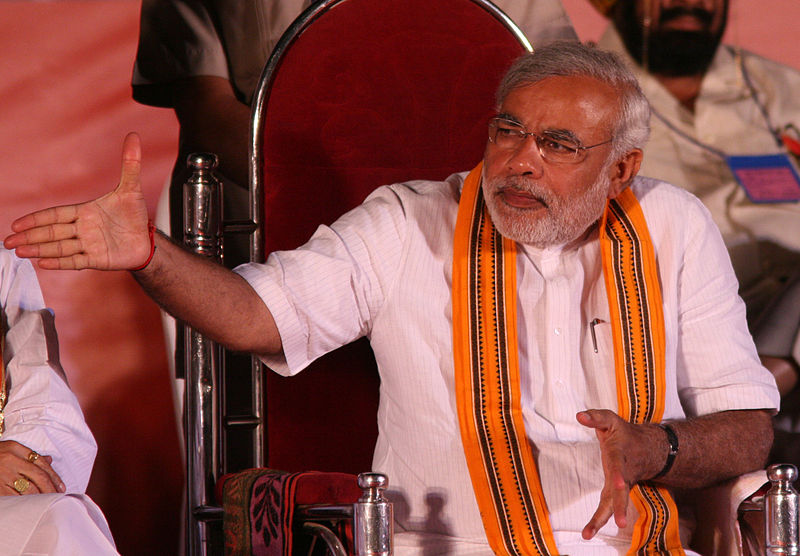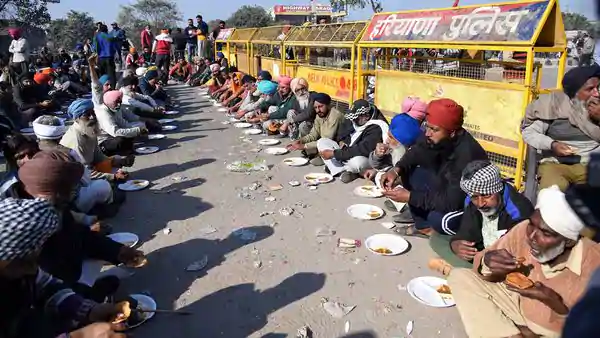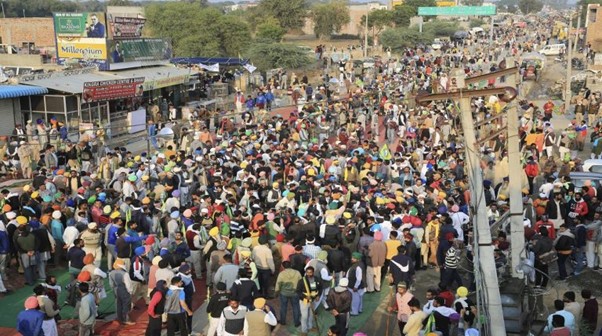Hundreds and thousands of farmers and members from different supporting organisations from different part of India are marching towards Delhi to stage an indefinite sit-in strike. The march 'Delhi Chalo' started on 26 November 2020 towards Delhi. Their major demands include the repealing of three Farmers Bills passed by Modi's government. Currently, farmers are blocking five entry points to Delhi and have paralysed the highway traffic to the city. It is reported that farmers partially besieged the city. Police and paramilitary forces brutally attacked the marching farmers with baton charge, tear gas and water cannons due to which many farmers were severely injured.
The state is forcing the protest leaders to unblock the entry–exit points and settle the sit–in in Burari ground which is about 20 KM away from the Rashtrapati Bhavan (Parliament) in the outskirts of Delhi. Farmers are saying that Burari ground is an open jail with heavy paramilitary presence. Farmers are not willing to go there and are still occupying the Singhu and Tikri borders of Delhi.
Farmers are getting nationwide solidarity and support from workers and trade unions. For the first time after one–day trade union strike on 26 November, Delhi transport workers' unions threatened an indefinite strike if the farmers' demands are not met by the government, and to paralyse Delhi roads. They include workers of private cabs, taxis, autos, buses and trucks. Their union leaders participated in the farmers' protests and showed solidarity. They gave two days ultimatum to resolve farmers' issues.
Student and academic organisations and their unions are also showing solidarity with the protesting farmers. Different oppressed religious groups facing persecution by the Modi government are also welcoming the march towards Delhi.
The government has given the cold shoulder to the farmers' protests. The emergency meeting of PM Modi, Home minister Amit Shah and Agriculture minister Tomar, which met to resolve the situation, came out with no solution. Modi has beefed up media campaigns explaining the benefits of the new farm laws for the Indian economy and society. He falsely termed the huge farmers' protest a ploy by opposition parties to weaken the government.
Other Bharatiya Janata Party (BJP) leaders and the right-wing media are spewing poison against the farmers day and night and are labelling protestors as anti-national goons, Khalistani nationalists, Naxalites, Shaheen Bagh Jihadists, foreign-funded agents, and so on.
They are using spiteful hatred, while advising opposition parties, to keep themselves away from the rouge protest. In fact, opposition political parties to a large extent are not involved in these protests. Mainstream media even falsely wrote about evidence of foreign funding to destabilise India. They are arguing that all those who are participating are anti-national, and sedition charges of the highest order should be levelled against them.
The government has cherry-picked 30 organisations from Punjab for negotiations on minor adjustments on the Farmers Bills, as they do not want to repeal them. They want to stand by them at all costs. Furthermore, they want to put debt cancellation and other economic demands out of the discussion.
Political crisis
Due to the farmers' protests, the BJP is suffering an internal crisis. Internal cracks within the BJP are intensifying with the advancement of farmers. Lately, the Punjab BJP general secretary and head of its Punjab youth wing resigned from their positions citing the farmers' discontent. A Haryana Member of the Legislative Assembly (MLA) resigned from his position of Chair from the livestock board and extended support to farmers. More BJP Allies are threatening to quit the National Democratic (NDA) coalition. The Shiromani Akali Dal (SAD) party of Punjab has already quit the coalition, and now more parties are following the trend including the RLP in Rajasthan.
The crisis is also laying bare the opposition parties who have nothing to offer to both workers and farmers. They criticise the Farmers Bills based on the way they were passed in parliament but are in total agreement to their contents.
 Modi has falsely termed the huge farmers' protest a ploy by opposition parties to weaken the government / Image: Al Jazeera
Modi has falsely termed the huge farmers' protest a ploy by opposition parties to weaken the government / Image: Al Jazeera
The Shiromani Akali Dal (SAD), a right wing party often portrayed as the face of Punjab farmers, is highly discredited. The Shiromani Akali Dal (AAP), a right-wing party ruling Delhi, is uncertain towards the Bills owing to their inability to handle the farmers' and workers' protests. Congress is also not providing an alternative to the crisis. Congress leader Rahul Gandhi showed his 'strong support' to farmers urging party members to consider distributing food packets to those protesting. Akhilesh Yadav, former chief minister of the state of Uttar Pradesh, and Shiv Sena, a far-right party ruling Maharashtra, are limiting their concerns to the mistreatment of farmers during protests.
The farmers' and workers' protests have also badly exposed the so-called Left parties who were unable to offer any solution to the crisis facing Indian workers and farmers. Secretary Generals of five left-wing parties, the Communist Party of India CPI, the CPI(Marxist), the CPI (Marxist-Leninist), Revolutionary Socialist Party (RSP) and the All India Forward Block (AIFB), released a joint statement, again confining their criticism to the manner in which the Bills were passed in the parliament, strongly voicing their support for following the "democratic process and norms". Almost all so-called left-wing parties have farmers' wings of their parties and farmers are looking towards their leadership to lead the march, but no call is coming for it. Rather than mobilising their cadres to lead the farmers' march, they recommended their cadres and members show solidarity in their towns "appropriate to their local conditions", ultimately meaning do nothing and remain home. This is precisely what happened in Maharashtra, Madhya Pradesh and Rajasthan where these parties have a significant presence of cadres among farmers but showed no mobilisation to join those marching towards Delhi. A rather limited militant action was organised by some elements of the CPI(M) where they occupied the State Bank of India branch in Rajapalayam to protest against the state's use of water cannons upon the farmers, as described by official sources.
Attacks by the right
All major parties in Punjab and other parts of India have been discredited by farmers' and workers' protests for many years now. Modi knows precisely that opposition parties are wrecked and won't gather significant support in the wake of mass movements. He is betting on people supporting his ruling BJP and intensifying his usual mantra of communal hatred along with increasing his arrogance, brutality and suppression on all movements threatening his regime.
He has used paramilitary forces and water cannons on protestors and is unwilling to negotiate on bill withdrawals. The BJP is further gearing the state apparatus to charge protestors with sedition and other numerous cases, leaving them to deal with the expensive and corrupt judiciary or face jail terms and continuous harassment by police for many years to come.
Amid farmers' protests, the government has added more anti–farmer and anti–worker bills into the negotiations, including the Electricity (Amendment) Bill 2020, to keep negotiations long, exhausting and in favour of the government.
Modi is further trying to break the farmers' unity by cherry–picking organisations for the negotiations. The government originally wrote to 30 organisations in Punjab for talks. Later they added 6 more organisations to the list. Among these, they only demand 7 representatives for table talks. The 30 selected organisation leaders started immediately distancing themselves from the farmers’ umbrella organization, the All India Kisan Sangharsh Coordination Committee (AIKSCC) and are preparing the ground to negotiate with the government over the acceptance of their demands. They even barred AIKSCC speakers from speaking in any rallies. This is creating severe tensions among members of the 30 organisations from Punjab, and AIKSCC representing 500 organisations from all over India including Punjab.
As the demands of farmers are moving ahead by proposing cancellation of farmers' debts and a reduction of input costs at the forefront, the middlemen, loan sharks and traders who have so far infiltrated the farmers through their organisations, or are leading several farmers organisations, see their business threatened with shutting down. They would either want the ‘debt cancellation’ demand taken out of the discussions, or they would like the government to guarantee them payments if the farmers' loans are cancelled. In both cases, these organisations would like to lead the negotiations and kick out those farmers' organisations demanding debt cancellation such as the AIKSCC.
Farmers should reject these gimmicks by the state to break farmers' unity. All careerist leaders should be exposed if they are willing to derail the farmers' movement.
The Immediate Way Forward
No doubt these bills are nasty and will devastate the lives of farmers. However, for many years farmers have been under continuous oppression and exploitation by the state, middlemen and banks due to the current laws and the capitalist system which is the root cause of all problems faced by farmers.
The farmers' march towards Delhi is the correct strategy adopted by farmers, showing significant development in their mass consciousness.
Farmers have to rely on their power; no middlemen and no opposition political parties will come to their rescue. For generations, farmers have been oppressed by various people of the system. This is a significant chance to set things right.
 If farmers retreat and show weakness, it will invite more aggression by the state and the right-wing / Image: ANI
If farmers retreat and show weakness, it will invite more aggression by the state and the right-wing / Image: ANI
If farmers retreat and show weakness, it will invite more aggression by the state and the right-wing. The state will unleash hell upon farmers' lives and will intensify brutality and exploitation significantly; the bloody events of the past like the 1984 Sikh massacre and the Jalianwala bagh massacreof 1919 will seem like child's play.
Farmers need to join forces with workers and trade unions for an indefinite general strike until their demands are met. One-day general strikes are a big step forward and are a huge show of strength by the working class, but so far this has not been able to solve the issues of the workers that we have seen in recent years. The Modi government has passed anti–trade union laws, and a one day strike could not repeal these. He is continuously passing anti–worker legislation with impunity and the only way to stop him is to move towards an indefinite general strike.
Farmers should force Modi to resign if their demands are not met. They should bring this draconian government down and take matters into their own hands and run society in their interests. For an indefinite general strike, farmers should call upon workers in different sectors such as those in fertiliser and pesticide factories, farm machinery factories, transport, banks, insurance companies, electricity generation, water supply, healthcare, education and others.
This strike could not only pave the way for the overthrow of the new anti–farmer legislation but could also overthrow this government, which is the enemy of the people. Also, such a strike would pose the question of who runs society, which in fact is the workers and farmers of this country, rather than the bankers, corrupt politicians, bureaucrats and filthy–rich capitalists living in luxury homes. This strike will also raise the question of the capitalist system, which is the basis of all exploitation of workers across the country and which can only be replaced by a socialist planned economy to guarantee a better life for millions of oppressed people exploited by the corporate sharks and supported by the brutal state apparatus.
We demand
1. Immediate resignation of Narendra Modi and Amit Shah
2. Immediate repealing of all anti–farmer and anti–worker laws
3. Immediate cancellation of all debts of farmers
4. All workers, students and youth of Delhi to join farmers to occupy Jantar Mantar Delhi.
5. Not to have a one-day strike, but to have an indefinite general strike until all demands are met.
Down with the Modi government
Long live the Indian farmers' struggle
Long live farmers' and workers' unity
For an indefinite general strike
Workers of the world unite!

